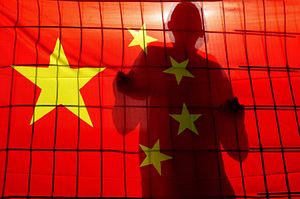Last week China accused the European Union of prejudice and ignorance for pronouncing concerns about the rights of Chinese lawyers. Stavros Lambridinis, the EU Special Representative for Human Rights, visited China, and in a subsequent press release expressed “strong concern about the recent arrests, detentions and summons of hundreds of human rights lawyers and activists.”
Among these is the case of a middle-aged woman named Wang Yu.
In 2008 Tianjin train officials barred Wang from boarding a train, despite her having already purchased a ticket. When she remonstrated, they beat her. Months later it was she, rather than her attackers, who was sent to jail for two and a half years.
The torture and slavery she witnessed in prison inspired her to become a defender of human rights, but to defend the legal rights of Chinese citizens is to become an enemy of the Chinese state. Last July her electricity was cut and she quickly texted friends that she could hear someone trying to break into her home.
State police had come in the night, presumably in boots and black shirts, and stolen her away without informing relatives whether she was alive or dead. They also lied to neighbors about their activity, telling them they were arresting a drug addict.
When Wang’s boss, Zhou Shifeng, requested an explanation, police arrested him too, along with his associates, and hundreds of other human rights lawyers. State media claimed police had successfully destroyed “a major criminal gang.”
What had Wang done that was so harmful?
She defended the Uighur academic Ilham Tohti, who has devoted his life to nurturing dialogue between ethnic Uighur and Han Chinese. She also represented the Feminist Five, who were arrested for handing out fliers in order to raise awareness about sexual harassment. And she represented one of the seven primary school girls from Jiangxi who were sexually abused by their teacher. These are the major cases that have defined Wang’s career since she was released from prison.
Lest you doubt whether the Chinese government would punish a woman for trying to defend children from rape, remember the case of Tang Hui. Tang’s 10-year-old daughter was kidnapped, gang raped and sold into prostitution, and when Tang sought justice, she was thrown into a labor camp. Public outrage won her release, but victories such as hers are rare, while fates such as Wang’s remain common.
One should nevertheless resist the temptation to perfunctorily tar the Chinese government. Even when it comes at the unconscionable cost of incarcerating heroes like Wang Yu or Tang Hui, stability is the ever-present aim. It is often a mindless and immoral resolution for stability, but one distinct from a consciously sexist agenda or the perpetuation of rape culture.
In fact, China actually ranks higher than the United States on the UN Gender Inequality Index. And the government is making slug-like but perceptible progress; although child rape and homosexual rape were effectively legal, earlier this month it was reported these loopholes have been closed.
The point is, the Chinese government is not opposed to human rights, and such accusations are unhelpful. Rather, it is opposed to human rights lawyers, feminists, academics, journalists, and any others who attempt to throw a spotlight on human rights issues. Quiet resolution is the state’s strongly preferred modus operandi.
The Chinese government views itself and its people with a kind of bodily integrity, and is therefore scornful of Western moralizing, which it considers an unethical infringement. But this requires the West to condone such abuses through silence. Plus, not all Chinese citizens themselves agree with the state’s view.
The state routinely goes well beyond what’s needed to maintain stability. Last month state police grabbed Wang’s son, and he now remains under house arrest with no visits, no mail, no phone calls, and no Internet allowed. He has been severed from the world because his mother wanted to help her fellow citizens.
The U.S. State Department expressed its concern last month regarding the “systematic campaign by China to target family members of Chinese citizens who peacefully challenge official policy and work to protect the rights of others.”
And it was in this milieu that Lambrinidis commented earlier this month, “[R]ule of law requires lawyers that can practice freely without fear of persecution and provide checks and balances against the miscarriage of justice.”
This week Foreign Ministry Spokesperson Hong Lei responded to these remarks by saying, “the press release turned a blind eye to the progress China has made in the cause of human rights … which not only interferes in China’s domestic affairs but also runs counter to the spirit of governance by the rule-of-law.”































